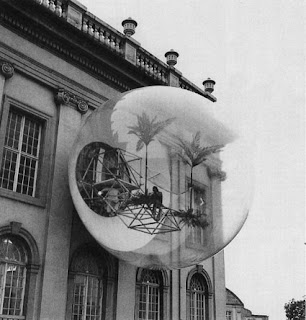From the Chiasmus Archive: October 13, 2020 . "REALMS OF THE IDEALIST. HAUS-RUCKER-CO (PART 1)" (A.Glass 2020)
This questioning was, in retrospect to the design such as the grandiose ideas of Archizoom and Super Studi, impractical as a concept, which were geared towards the viewer to react to the large scale structural blueprints as a visual medium. It was the young Austrian design team of Laurids Ortner, Gunter Zamp Kelp and Klaus Pinter that founded Haus-Rucker-Co in 1967, which aimed to bridge the speculative aspects of architectural design to more of a practical interaction. It could be argued that we, at this moment in time when looking back at the idealisms of design, are living in a simulacrum of past concepts, trapped by both a sociological and technological plateau within the current digital landscape. But, the 1960s was an era that was as close as you could get to the annihilation of the human race, in the shadow of a nuclear exchange between the superpowers. Yet, there is a similarity to our fast paced technological age, under a thinly veiled globalized world and its feigned stability, the threat of a nuclear war still lurks. Also, a more pressing issue is rapidly changing weather from global warming and of recently a new and unknown respiratory disease, called Covid-19, has spread throughout the world at an alarming rate in less than ten months, infecting millions and killing over a million people globally. A virus that jumped from, as a distinct possibility, from a zoological animal to human. Which may further indicate that dormant viruses will continue to infect humans via the depletion of natural habitation.
If we look at Haus-Rucker-Co appeal as a design collective, even though they disbanded in 1976, was their attempt at setting a precedence of tangible product design within a tumultuousness period that was the mid 60's and 1970s. Like their radical contemporaries in architectural study, there was a fascination to draw on what was conceived over three decades ago, that a Utopian nobility of a city construct could be developed through interactions. Or at least to question manifestations, which Haus-Rucker-Co achieved in their tenure, amidst a technologically changing world. While the dawn of nuclear power and the invention of the micro chip beckoned, society began rapidly overreaching its ambition through technology and urban expansion. Haus-Rucker-Co, in some of their early projects, may have offered an insight to what we are witnessing today – a society consuming itself.
___
(A.Glass 2020)





Comments
Post a Comment